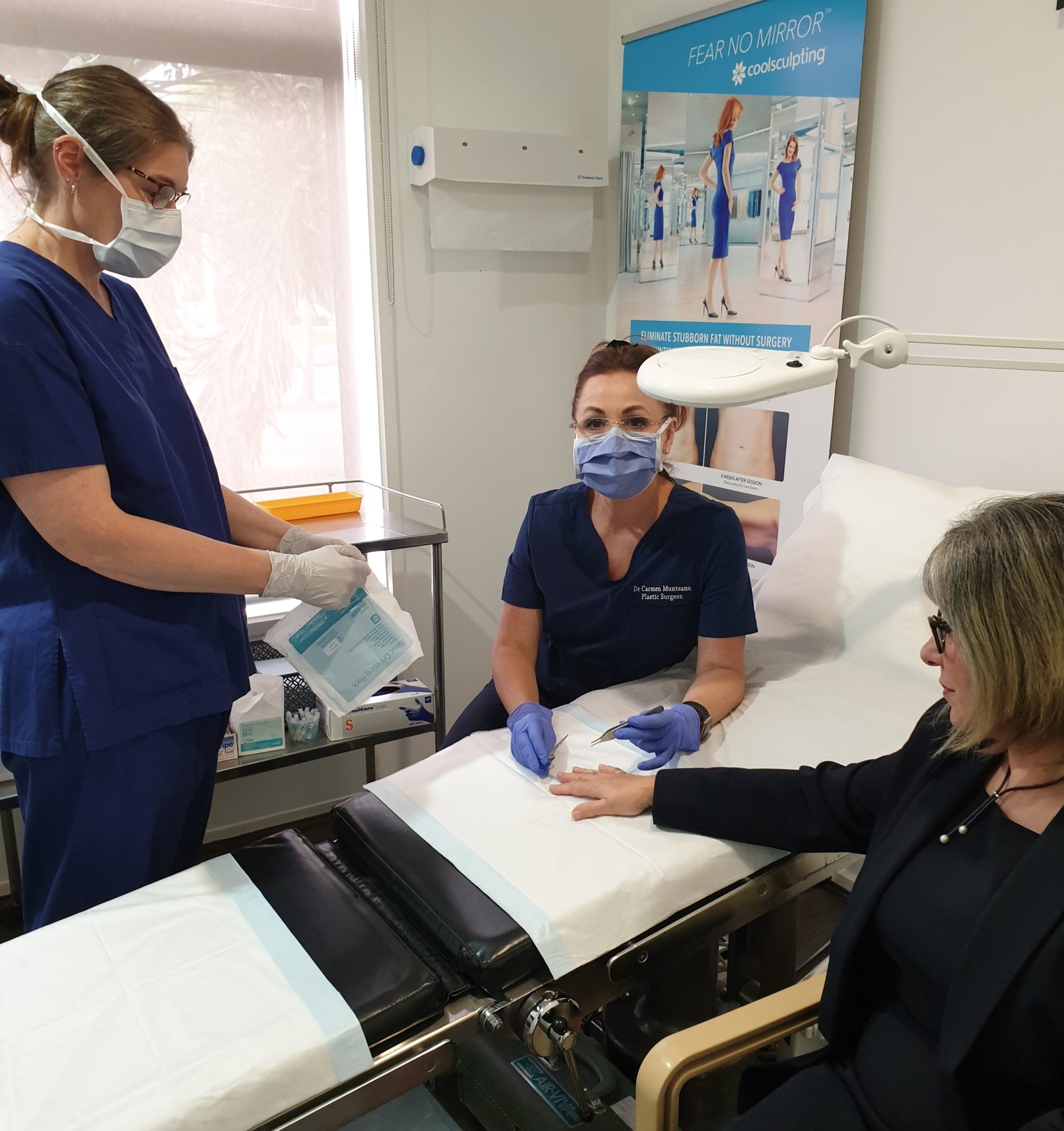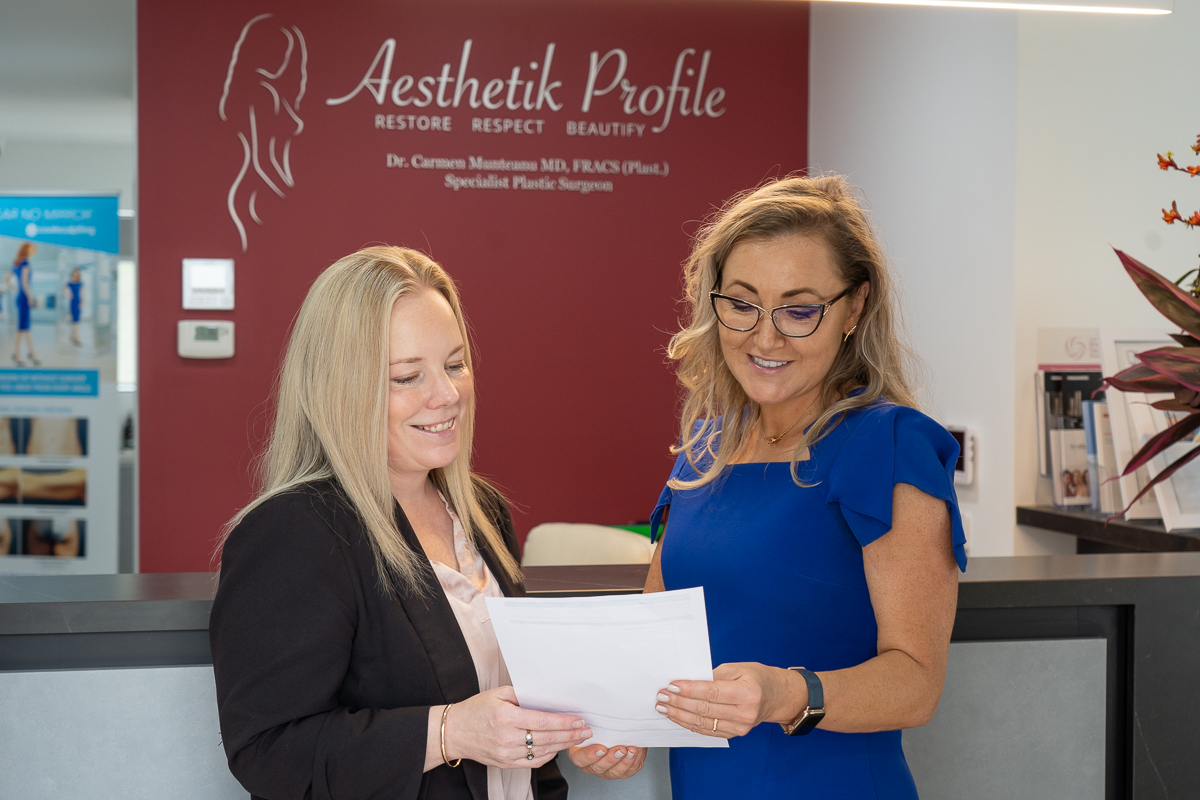If you are considering a tummy tuck– abdominoplasty for flattening your tummy, it is important to consider the best recovery after abdominoplasty.
First things first, recovery will look different for everyone. Your recovery will depend on your age, health, body weight and type of tummy tuck – abdominoplasty. It is vital to give your body enough time to heal effectively. You will be required to stay at the hospital for a few hours or even a day after the surgery. Dr Carmen will also give you instructions to adhere to after the surgery. You will be well prepared.
Download Dr Carmen’s Guide to Tummy Tuck Surgery – Abdominoplasty
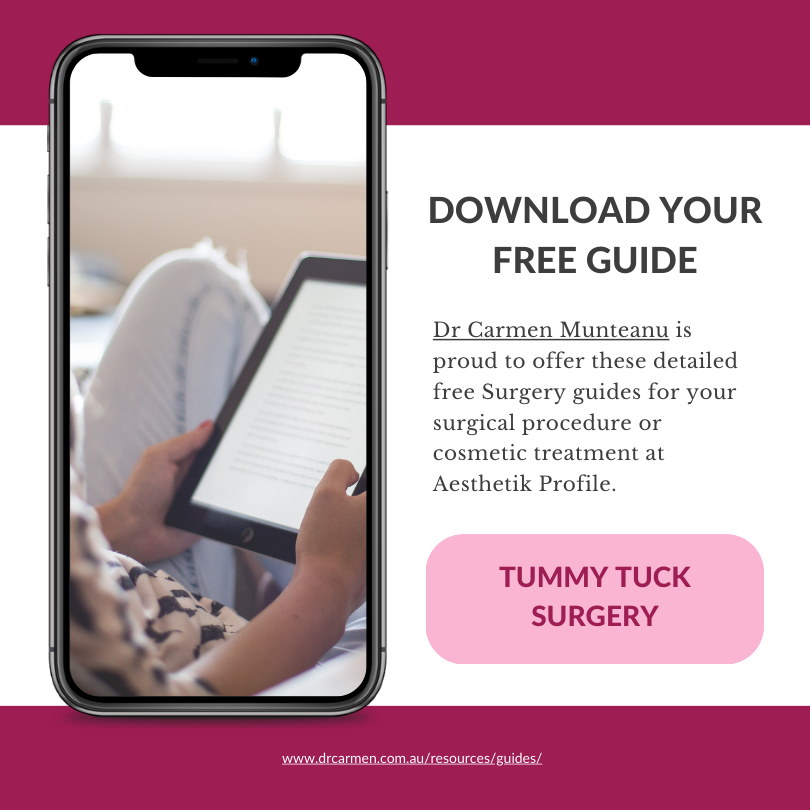
6 Recovery Best Practices by Dr Carmen’s
Post-surgery is always a time for investing in your own healing, this will give you a faster and more effective result – less swelling or pain, better movement, and more effective scar reduction.
- Swelling is very normal; this will cause difficulty with muscle movements and general stiffness of gait.
- Daily showering is OK during the hospital stay once the drain tubes have been removed. Showers should always be brief and warm (but not hot).
- Scar minimisation tapes encouraged for 2 – 4 months then change to silicone cream or tape.
- Driving is discouraged for up to 3 weeks post-surgery. Often due to several factors – pain or stiffness, use of strong painkillers, lack of concentration and strength.
- Gentle short walks can commence 7 days post op, as tolerated. Distance should be no longer that 15 minutes unless advised by the clinic. Walks can be daily or even twice daily, again as tolerated, this will also depend on how sore or swollen you feel.
- Wear your Support Garments – Dr Carmen firmly believes in fitted shapewear post-surgery and is insistent that it is worn for the first 6 months post op, both night and day.
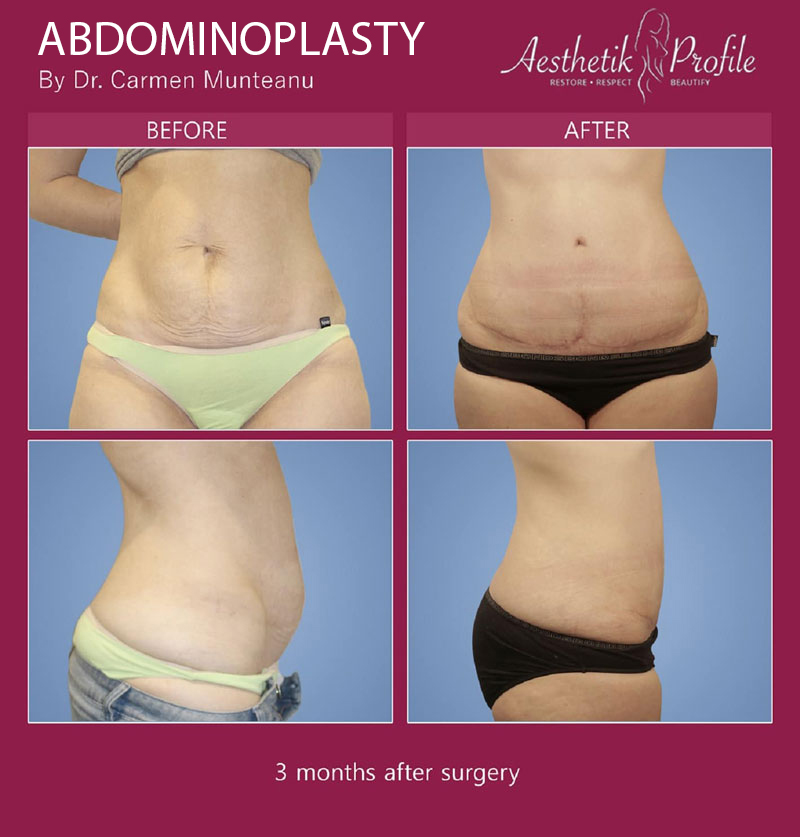
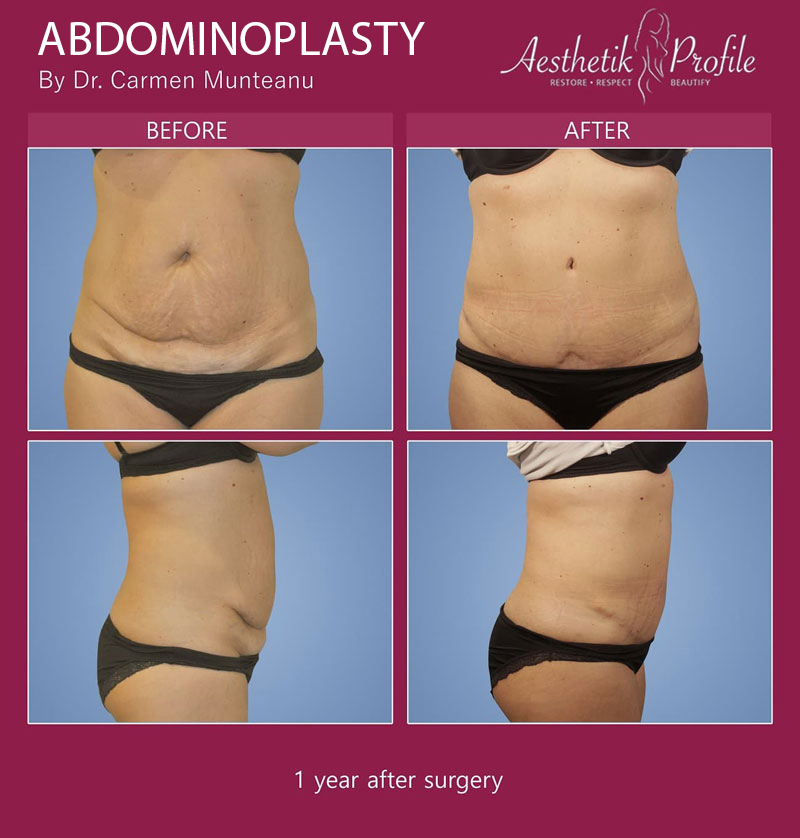
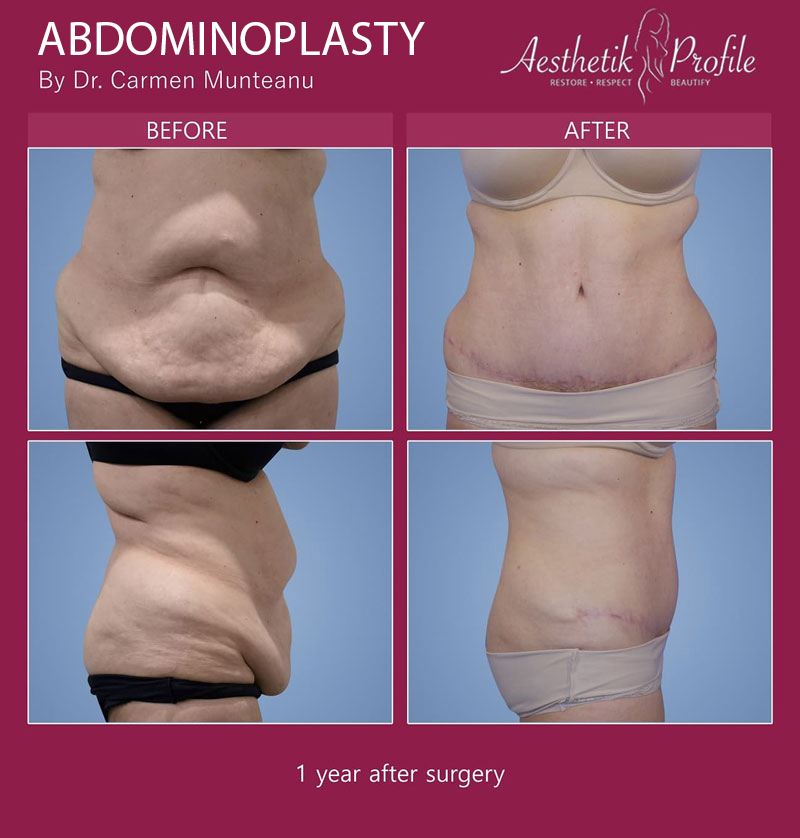
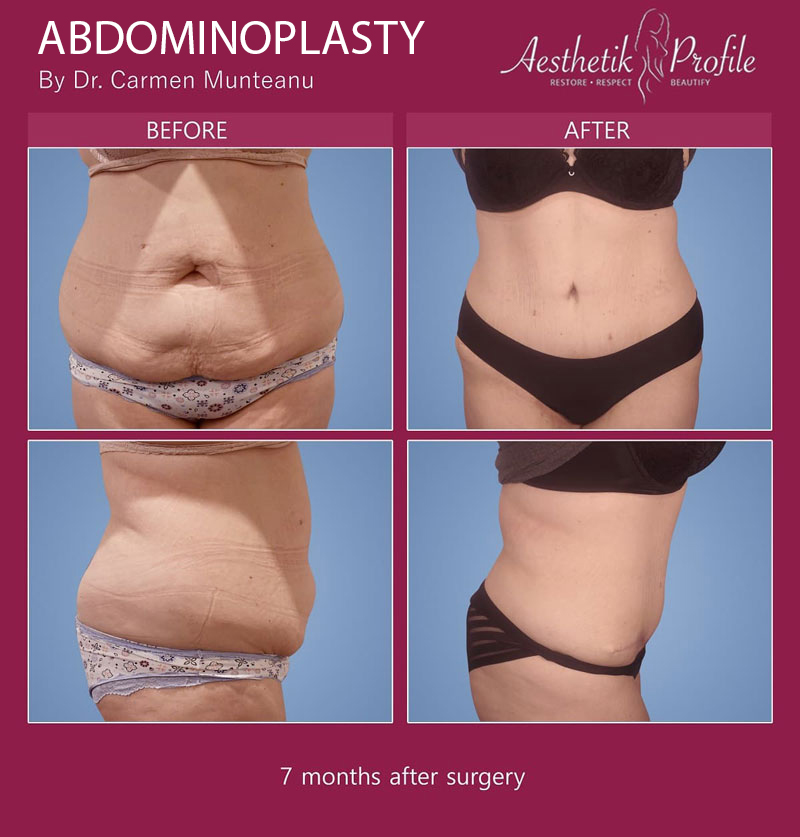
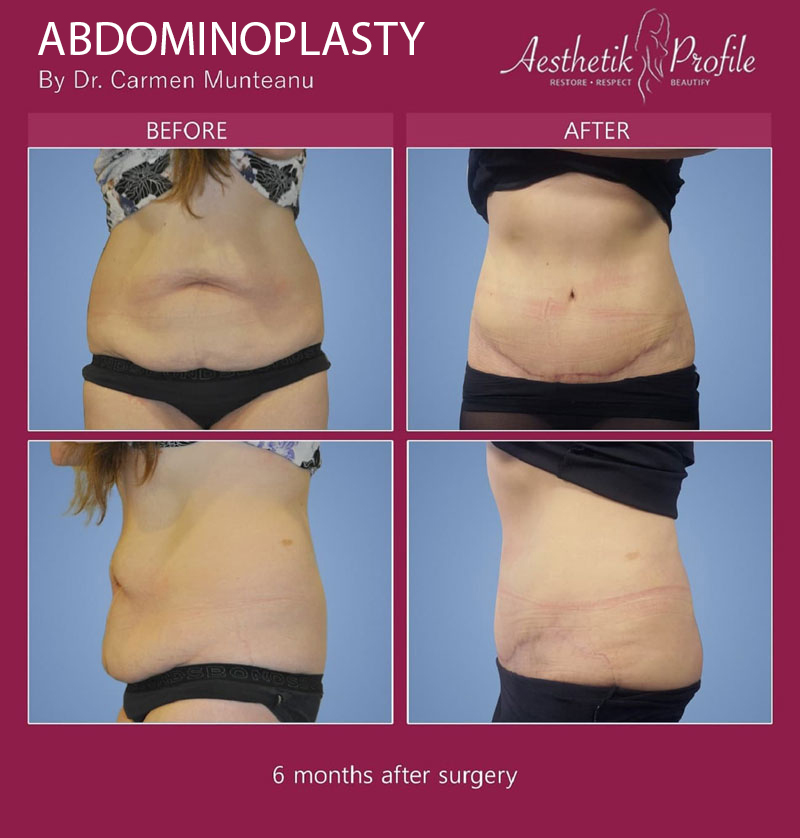
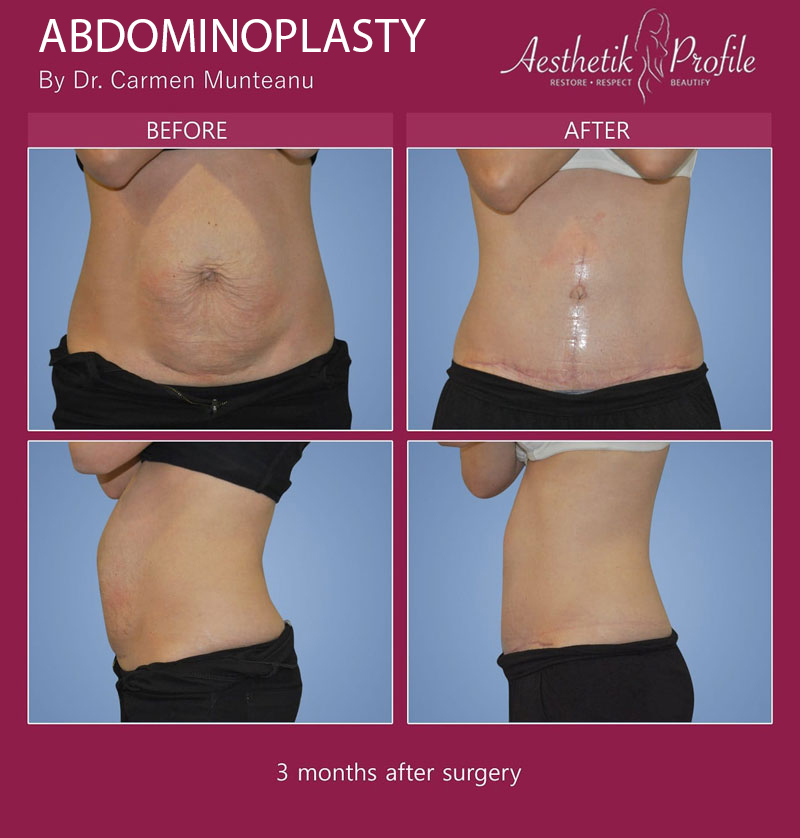
Timeline for Recovery after Tummy Tuck – Abdominoplasty
Immediately after the surgery, you will be taken into a recovery room. A healthcare professional will monitor and check your incision, and you will usually be allowed to go home the day after surgery. Surgical drains will usually be removed before leaving hospital.
During your time in hospital, Dr Carmen will guide you regarding the recovery time, incision care and when to resume work, activity etc.
First Few Days after Surgery
You will need someone to drive you home so arrange for it in advance as you won’t be able to do it yourself. Most likely, you will have drainage tubes that will drain the fluid from your tummy.
You also need to arrange for someone to help you around the house for the first few days as you will have limited mobility. Tightness around the tummy area is very common during the initial few weeks. It is advised to walk in a hunched-over position for a week or two.
It is common to feel sore in the stomach area, which will be accompanied by pain. Make sure to take the pain killers prescribed by Dr Carmen on time.
Week 1-2 After Surgery
During the first two weeks, avoid standing for longer durations, lifting heavy objects and excessive movement. It is advised to take a month of work for optimal rest and recovery.
If you have a lot of responsibilities around the house, it is wise to arrange for some house help for a couple of months post-surgery. Do not resume physical activity until Dr Carmen gives you permission. You can resume driving after two weeks and slowly ease yourself into daily chores. You will experience scarring after the surgery that will take time to fade away. Don’t panic, and let your body heal at its own natural pace.
Bathing is also a struggle for the first week or two. Opt for sponge baths or use a chair while showering for the first two weeks post-surgery.
After two weeks, you will be able to walk straight. This is the time to introduce light walking into your routine. Remember not to exhaust yourself.
One Month After Surgery
Constipation is very common around the one-month marker. Eat fibre rich meals to avoid constipation. You can also use over-the-counter stool softeners to help you. Also, drink loads of water.
Visit Dr Carmen for follow-up appointments to ensure everything is running smoothly. Never skip on those even if your recovery is going great. It prevents any complications and takes care of any unforeseeable risks.
Most patients can go back to work after a month marker. However, if your job is physically demanding, consult Dr Carmen’s team before resuming work.
8 Weeks/2 Months Post Surgery
Avoid taking baths and jumping into swimming pools for eight weeks post-surgery or till your incisions are fully healed. Most patients can also resume exercise eight weeks after the surgery. Always consult with Dr Carmen prior to resuming any physical activity.
Guideline to Recover Quickly After the Surgery
It is important to give your body enough time to heal after the surgery. First things first, take plenty of rest after the surgery. Make sure you take the specified time off work, so you can give your body adequate time to recover. Your drains will be left in a few days after the surgery to empty out any excess fluids. You will most likely be asked to take antibiotic and anticoagulant while the drains are in place. Wearing an abdominal binder is critical for recovery as it supports the abdomen, avoids fluid build-up and reduces swelling after the surgery.
Avoiding strenuous activities for a period of six to eight weeks is critical. It includes everything from lifting heavy weights to working out excessively. Mild walking is permitted and recommended after the first two weeks.
Make sure that you arrange for someone to drive you home after the surgery and maybe help you around for the first 24 to 48 hours.
Your drainage tubes will most likely be removed 48 hours after the surgery. After that, you can take a sponge bath for three to five days or until you can shower. You might need to use a chair while showering for the first two weeks post-surgery.
Avoid consuming alcohol and smoking as it hinders the healing process and causes excessive bruising and other complications. Avoid taking any over the counter medications and herbal supplements without consulting Dr Carmen first.
Rest and Recovery Post Tummy Tuck – Abdominoplasty
You need to sleep on an incline for at least the first two weeks after surgery. It is important that your body is slightly raised and your knees are bent. Taking a little bit of care while sleeping will minimize swelling and take the pressure off your abdomen. You can also put some pillows under your knees for added comfort. The goal is to find an optimal resting position that makes you feel comfortable.
Once the initial two weeks are over, it is advised to walk a little bit around the house to promote blood flow. It aids healing and reduces the chance of getting blood clots.
Remember, it will take a minimum of seven to eight weeks before you feel like yourself. Stay calm and give your body enough time to heal. Avoid any demanding physical activity, including exercise, for eight weeks. Always consult Dr Carmen before resuming exercise and going back to work.
Additional Ideas to Speed up Your Recovery after Tummy Tuck – Abdominoplasty
Apart from doing all the essentials mentioned above, follow these tips to give your body the an added boost:
- Take vitamin A and C supplements regularly.
- Adding green tea to your daily routine will boost your immunity and antioxidant levels.
- Taking a probiotic supplement always helps.
- Eat fruits such as pineapple and papaya as they help reduce swelling.
- Take arnica as it helps reduce swelling, bruising, and pain.
- Use staphysagria supplements as they are known to help heal your incision faster.
- Drink ginger tea to relieve symptoms of nausea.
Abdominoplasty Do and Dont’s
What are the dos and don’ts after a tummy tuck – abdominoplasty?
- Here are a few dos and don’ts after the surgery:
- Do’s
- Eat a fibre-rich, healthy diet to avoid constipation.
- Keep your knees bent while sleeping.
- Wear the compression garment for at least eight weeks.
- Walk slowly and regularly.
- Take your medications on time.
- Don’ts
- Do not walk with your back straight for two weeks.
- Avoid laughing, coughing and sneezing.
- Do not take hot baths and swimming pools.
- Avoid doing any strenuous exercises.
- Do not skip on medications
- Do’s
Abdominoplasty Recovery FAQs
How long does it take to heal after abdominoplasty?
- On average, it takes about eight weeks for a person to heal and feel like themselves after abdominoplasty.
How long does tightness last after abdominoplasty?
- For most patients, the feeling of tightness will last for 6 –12 weeks after the surgery.
What is the fastest way to recover from a tummy tuck – abdominoplasty?
- Wear an abdominal binder for a minimum of six weeks after abdominoplasty. Avoid exercising and any strenuous activities. Take plenty of rest, sleep, eat a healthy diet and take all the medications given by your doctor on time.
How bad is the pain after a tummy tuck – abdominoplasty?
- Most people experience mild to moderate pain during the recovery period. Dr Carmen will prescribe you painkillers to counter pain and have a comfortable recovery.
Why is my stomach still big after a tummy tuck – abdominoplasty?
- Well, your stomach will be swollen for the first few weeks after the surgery. Once the swelling goes down, your stomach will not appear bigger.
What happens if you don’t wear a compression garment after the surgery?
- You need to wear a compression garment. Otherwise, it can lead to over-stressed sutures, breakage, tearing, seroma formation and progressive tension.
How do I get my stomach flat after a tummy tuck – abdominoplasty?
- Here are a few tips that will help you; eat a healthy diet, consume loads of water during the recovery phase and continue to eat well-balanced meals after recovery to avoid weight gain.
When can I sleep on my side after a tummy tuck – abdominoplasty?
- You should be able to sleep on your side three weeks after the surgery.
How long should I wear my Faja after the surgery?
- It is advised to wear your Faja for at least eight weeks after the surgery.
Why is my stomach not flat after a tummy tuck – abdominoplasty?
- The reason why your stomach is not flat is that it’s swollen. Once the swelling goes down, your stomach will appear flat.
Does an abdominoplasty lift your pubic area?
- The surgery focuses on the belly region, hence do not expect a dramatic pubic lift. In some cases, it gives a slightly lifted appearance to your pubic area as well.
What hurts worse, C section or tummy tuck – abdominoplasty?
- C section is considered to be a far more painful procedure than an abdominoplasty.
Do you eat less after an abdominoplasty?
- It is common for people to have a smaller appetite for the first three to five months after the surgery.
What hurts more, lipo or tummy tuck – abdominoplasty?
- A tummy tuck – abdominoplasty is considered to be more painful as compared to liposuction. Keep in mind that Dr Carmen will use anaesthesia during both procedures, so you don’t feel anything when the procedures are performed.
How long is the stomach swollen after an abdominoplasty?
- Most patients experience swelling for three months after the surgery.
Can you gain belly fat after an abdominoplasty?
- Yes, if you gain weight after the surgery, you will also gain belly fat.
How long do you walk hunched over after a tummy tuck – abdominoplasty?
- It is advised to stay hunched over while walking for a period of two weeks after the surgery.
What are the dos and don’ts after a tummy tuck – abdominoplasty?
- Here are a few dos and don’ts after the surgery:
- Do’s
- Eat a fibre-rich, healthy diet to avoid constipation.
- Keep your knees bent while sleeping.
- Wear the compression garment for at least eight weeks.
- Walk slowly and regularly.
- Take your medications on time.
- Don’ts
- Do not walk with your back straight for two weeks.
- Avoid laughing, coughing and sneezing.
- Do not take hot baths and swimming pools.
- Avoid doing any strenuous exercises.
- Do not skip on medications.
- Do’s
How long does it take for the lymphatic system to heal after an abdominoplasty?
It will take about two to three months for your lymphatic system to heal fully after the surgery.
Can you climb stairs after a tummy tuck – abdominoplasty?
- Climbing stairs is permitted after the surgery. If it hurts, take some help or avoid climbing the stairs altogether till you are comfortable doing so.
What is the best diet after an abdominoplasty?
- Eat a fibre-rich healthy diet after the surgery during recovery. Continue eating healthy, well-balanced meals after the tummy tuck – abdominoplasty surgery to avoid weight gain.
Final Thoughts
We get that there is a lot to consider and remember as far as the recovery period goes. But, if you prepare for the surgery in the right way, you can manage it easily. Planning for all aspects, and following all the post treatment care instructions will help you heal faster. You will feel better with every passing day. If you feel any serious complications such as pain, bleeding and infections, immediately contact Dr Carmen. Do not wait it out, as it can lead to serious complications. It is always better to be safe than sorry.
If you still have any questions or wish to book an appointment with the tummy tuck – abdominoplasty surgeon, fill out the consultation form, and we will get back to you shortly. Alternatively, you can also give us a call or send us an email.
Further Reading about Abdominoplasty with Dr Carmen
- Read Dr Carmen’s Tummy Tuck – Abdominoplasty Surgery Page
- Read Dr Carmen’s Blog about Recovery after Tummy Tuck – Tips, Timeline and FAQs after Abdominoplasty
- Read Dr Carmen’s Blog about Will Medicare Cover My Tummy Tuck – Abdominoplasty?
- Read Dr Carmen’s Blog about Preparing for Abdominoplasty Surgery
- Read Dr Carmen’s Blog about Extended Tummy Tuck FAQs – Questions about Extended Abdominoplasty
- Read Dr Carmen’s Blog about When Can I Exercise after Abdominoplasty Surgery
- Read Dr Carmen’s Blog about Tips for Sleeping after Abdominoplasty Surgery

